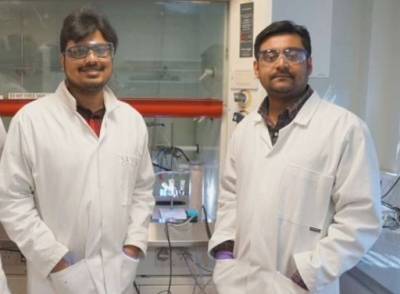London– Two UK researchers, who are alumni of the Indian Institute of Technology (IIT), have developed a new method to transform carbon dioxide (CO2) captured from industrial processes — or even directly from the air — to clean, sustainable fuels, using just the energy from the sun.
The researchers currently working at the Department of Chemistry in the University of Cambridge, UK, developed a solar-powered reactor that converts captured CO2 and plastic waste into sustainable fuels and other valuable chemical products.
In tests, CO2 was converted into syngas — a key building block for sustainable liquid fuels –, and plastic bottles were converted into glycolic acid, which is widely used in the cosmetics industry.
Although improvements are needed before this technology can be used at an industrial scale, the study, reported in the journal Joule, represents another important step toward the production of clean fuels to power the economy, without the need for environmentally destructive oil and gas extraction.
“This solar-powered system takes two harmful waste products — plastic and carbon emissions — and converts them into something truly useful,” said Dr. Sayan Kar, an alumnus of IIT Kanpur.
“The fact that we can effectively take CO2 from air and make something useful from it is special. It’s satisfying to see that we can actually do it using only sunlight,” Kar said.
The researchers adapted their solar-driven technology so that it works with flue gas or directly from the air, converting CO2 and plastics into fuel and chemicals using only the power of the sun.
By bubbling air through the system containing an alkaline solution, the CO2 selectively gets trapped, and the other gases present in air, such as nitrogen and oxygen, harmlessly bubble out. This bubbling process allows the researchers to concentrate the CO2 from air in solution, making it easier to work with.
The integrated system contains a photocathode and an anode. The system has two compartments: on one side is captured CO2 solution that gets converted into syngas, a simple fuel. On the other side, plastics are converted into useful chemicals using only sunlight.
“The plastic component is an important trick to this system,” said Dr. Motiar Rahaman, an alumnus of IIT Madras.
“Capturing and using CO2 from the air makes the chemistry more difficult. But, if we add plastic waste to the system, the plastic donates electrons to the CO2. The plastic breaks down to glycolic acid, which is widely used in the cosmetics industry, and the CO2 is converted into syngas, which is a simple fuel,” he added.
The scientists are currently working on a bench-top demonstrator device with improved efficiency and practicality to highlight the benefits of coupling direct air capture with CO2 utilisation as a path to a zero-carbon future. (IANS)




